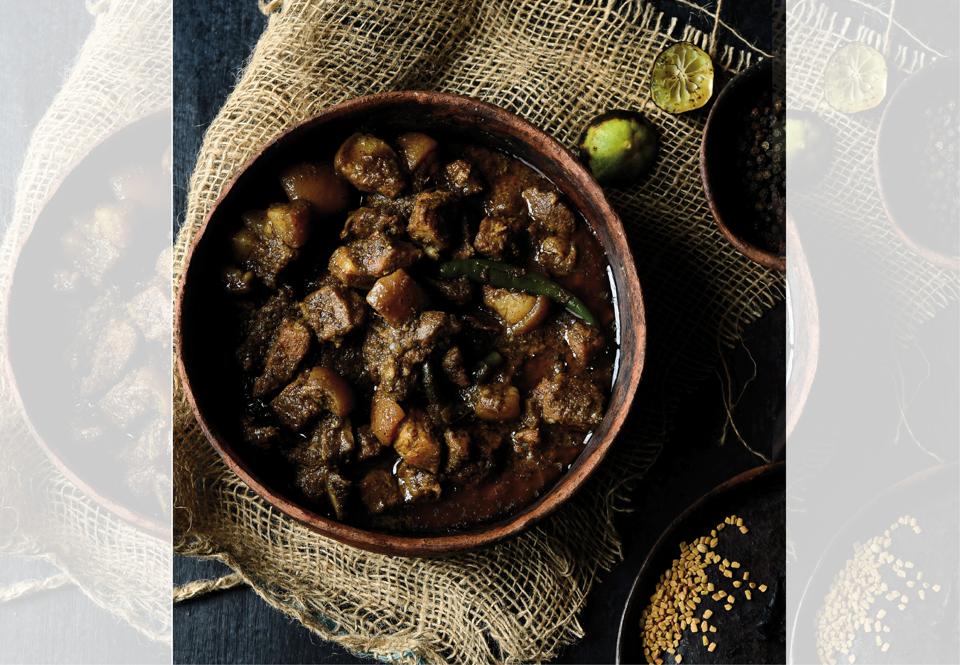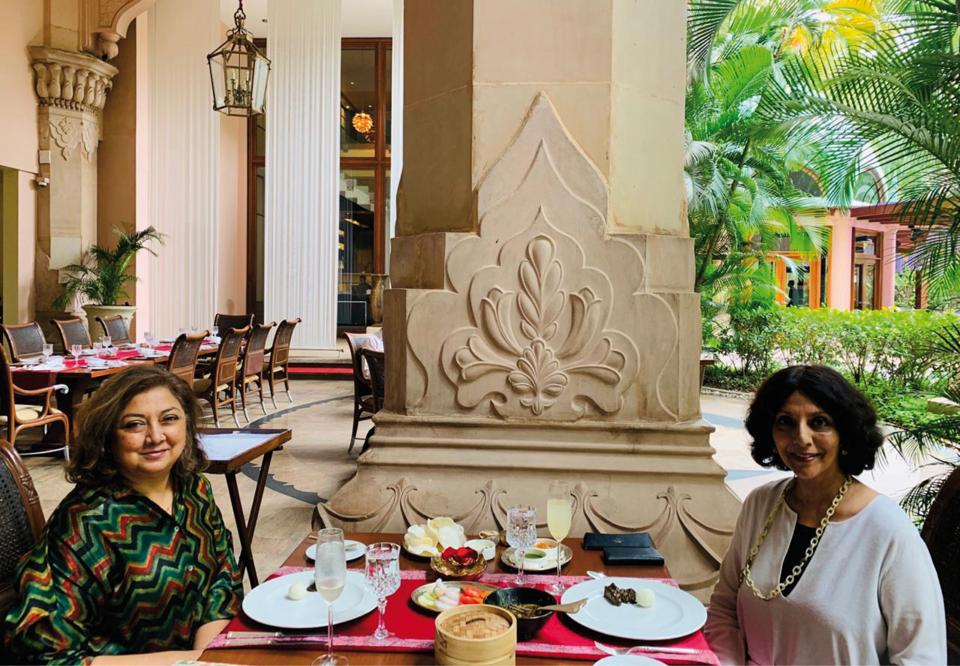Although there are many versions of this ancient dish, no article on Coorg food is complete without this pork delicacy.

In continuation of my eulogy on Coorg, I came across a wonderful person, Kaveri Ponnapa, dedicated to the Coorg Table, preserving traditions and informing us in a style reminiscent of 19th century romantic novels, about the flavours, aromas and life in Coorg. I had a Coorg lunch with her in Bangalore where she now lives and I was enlightened about Coorg spices, specialities and ingredients.
No article on Coorg food is complete without the famous Pandi curry…here’s what she has to say and her recipe.
“The Coorgs retreat to their homes, fields and ancestral strongholds to harvest, feast, sing and dance…The community hunt, once so much a part of these celebrations is gone; hunting parties no longer comb the forests in pursuit of wild boar, preferred, as recorded by early visitors to the land, by the Coorgs to all other meat. But true to tradition, pork features at the puthari feast.
An ancient tradition
We smoke, dry, preserve, curry, braise, fry and roast pork, extracting every ounce of flavour, varying the texture as much as we can, sometimes scooping a spoonful of preserved pork fat from a ceramic jar into a dish, intensifying flavours. At the big village feasts and celebrations, besides the barbequed pork, there is always a deep, rich, pandi curry…There are probably as many versions of this ancient dish, born out of our hunting past, as there are kitchens. I have my own favourites, tasted at various tables and feasts.

Food changes with the ingredients available at hand; but sometimes one comes across a dish that has evolved so perfectly in its own time and place that it is best left alone. The personal benchmark for pandi curry came to me from a set of proportions for dry spices I wrote down in a journal more than three decades ago. It has travelled with me across countries and continents; every mouthful takes me back to Coorg, to that particular collective history —of forests, and a coming together of culture and spices from where this curry emerged.
If you cook it, you should get is something like this: cubed chunks of tender pork in a dense, molten gravy, releasing the slow heat of black peppercorns, grown in the hills of Coorg since the times when wild vines could be seen looping across trees, sketching great arcs and webs across the dense jungles. Red chillies were latecomers: even the violent little bird’s eyes, referred to locally as parangi, betray their foreign origins. Hidden notes from dark roasted spices that have survived a pounding in a mortar and pestle, and have begun to release their flavours into the pork should follow the heat of the roasted peppercorns. A sharp burst of kachampuli —that’s all you need—to slice through the gleam of melted fat. You may like a squeeze of lime, just for its exuberant freshness, before you tuck into a plateful. If you happen to have a wood fire in your kitchen and the patience to slowly meld all its flavours into one, harmonious whole: fierce, crushed ginger; a touch of golden sesame oil; all those dark spices, and rendered fat, it’s unlikely that you will ever forget the taste. It is as perfect a dish that ever came out of an extraordinary place.”
Coorg Pandi Curry
Ingredients
For the spice mix:
1 tbsp black peppercorns, or more, according to taste
1 tbsp cumin seeds
1 ½ tbsp coriander seeds
1 tablespoon mustard seeds
A pinch of fenugreek seeds
(1 teaspoon of cassia bark; ½ teaspoon cardamom; ½ teaspoon cloves, optional)
Dry roast each of the above spices separately, cool and grind to a powder in a mortar and pestle or spice grinder
For the curry:
1 kg pork, a combination of lean meat, fat and bone, cut into approximately 1-inch cubes
1 tsp turmeric powder
Red chilli powder to taste, optional
3 large onions
3 inch root ginger, scraped
1½ bulbs garlic peeled
2-3 fresh green chillies slit
3-4 tablespoons sesame oil
Salt to taste
2cups hot water
1 level tbsp kachampuli (Coorg vinegar)
Method
Wash the pork, pat dry. Sprinkle with turmeric powder, and red chilli powder if using, mix well, and set aside. Chop the onions finely. Scrape the ginger, peel the garlic, and grind together to a smooth paste in a food processor. Slit the green chillies and set aside.
Heat the sesame oil in a pressure cooker, and when hot, add the chopped onions. Stir and fry over medium heat until translucent. Add the ginger-garlic paste, and fry until the raw smell disappears. Add the marinated pork cubes, raise the heat and fry until the meat changes colour. Now reduce the heat, add the dry-roasted spices, and mix until the cubes of pork are well coated with the spice mixture. Add salt to taste, 2 cups hot water (more or less, according to the thickness of gravy you prefer) and bring to a boil over medium heat. Cover, reduce the heat to low-medium, and pressure cook for about 20 minutes. Remove from the heat. Allow the pressure to drop. Test for doneness. The pork should be tender but firm. Return to the heat, toss in the slit green chillies, add the kachampuli, and simmer for about 5-7 minutes over low heat. Serve with an extra squeeze of lime and kadambuttus (steamed rice dumplings). Pandi curry a few days old tastes even better.
Author Bio: Culinary expert and explorer Karen Anand has been writing extensively on the subject of food and wine for 30 years. Apart from having her own brand of gourmet food products, she has anchored top rated TV shows, run a successful chain of food stores, founded the hugely successful Farmers Markets, and worked as restaurant consultant for international projects, among other things. Her latest passion is food tours, a totally curated experience which Karen herself accompanies, the first of which was to Italy.
source: http://www.hindustantimes.com / Hindustan Times / Home> Brunch / by Karen Anand, Hindustan Times / September 28th, 2019

